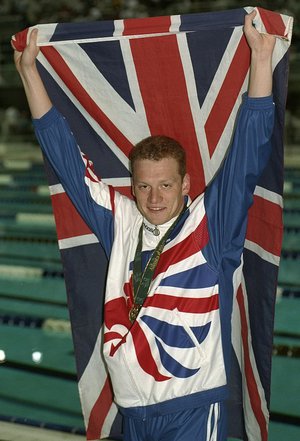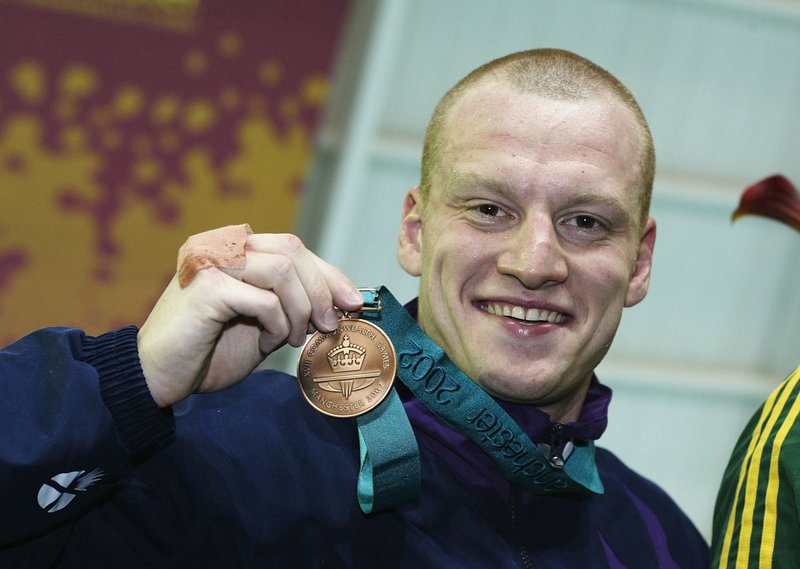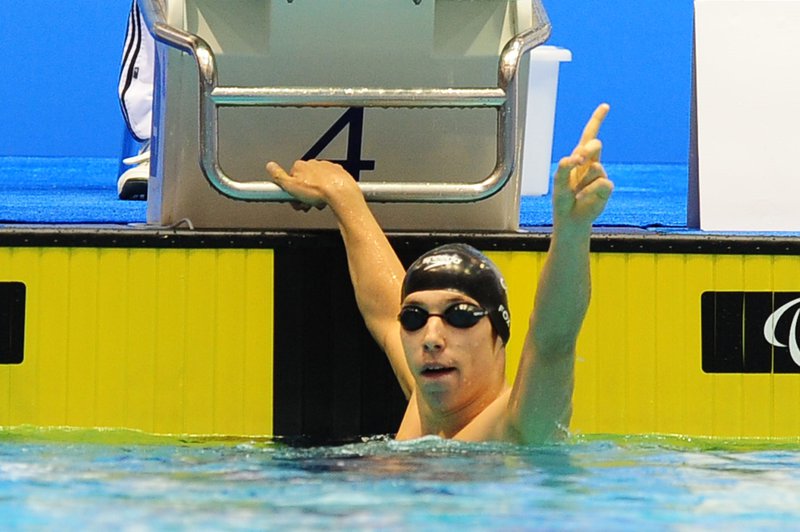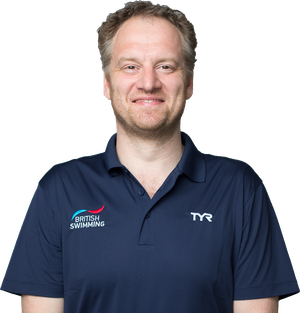We are turning back the clock to relive the careers of some of British Swimming's most successful figures of recent times in our Splashbacks feature - with the help of the stars themselves.
In this instalment, Olympic medallist and current Para-Swimming National Performance Centre Lead Coach, Graeme Smith, reflects on the feeling of reaching the podium at Atlanta 1996, the biggest lessons he learned from his time competing in the pool and how he is using those lessons to help Britain's elite para-swimmers in their own searches for success.
For the majority of us who will never experience what it is like to represent our country at an Olympic or Paralympic Games, it is an easy assumption to make that the emotions of winning a medal at the biggest sporting event on the planet would be nothing but positive.
But when Smith looks back 24 years, to his medal-winning moment at the Olympics in Atlanta, he recalls a very different feeling in the seconds after the Men's 1500m Freestyle final came to an end.
"It sounds strange, but initially on the night, as soon as I touched the wall, it was frustration," says the Falkirk-born man.
"It wasn't even so much that I had just got touched out for the silver by 0.05 seconds in a 15-minute race. It was more that going into it, Kieren Perkins, who eventually ended up winning, wasn't in the best shape of his life - or hadn't appeared to be - and I genuinely thought there was a chance to be Olympic champion that day.
"As with most athletes who want to win a race or be the best they can be, I think probably the solace of the day was actually that it was the best time I had done. But to this day, I still I feel I should've gone under 15 minutes, rather than the 15:02 I went on that evening in Atlanta.
"So initially it was frustration, then as the second week of the Games progressed, a bit of perspective came into it. If I'm honest, though, I don't think it was fully until I got home that it settled in.

"There wasn't the social media there is nowadays, so it wasn't until I landed back at Manchester Airport, where there were TV crews and people waiting to see you, that the enormity of what I'd actually achieved started sinking in.
"Then as time progressed, when we didn't come away with a medal at Sydney 2000, I think that reaffirmed even more how special winning an Olympic medal is, and I became prouder as the years passed."
Smith's mantelpiece would ultimately end with world, European and Commonwealth medals on it as well, with the now-44-year-old acknowledging the silver and bronze won at the 2001 World Championships in Fukuoka as among the most special of his career.
That was not only because of the medals themselves, but also because it followed hot on the heels of him missing out on Olympic qualification for his favoured 1500m Freestyle event at Sydney 2000.
Indeed, Smith thanks his brother for keeping him going in the sport at that point and helping lay the platform for one of his greatest successes, which saw him finish second in that 1500m event and third in the 800m.
"I made the Sydney 2000 team as a reserve for the 4x200m Freestyle relay, but the 1500m, my main event, to go from winning a bronze medal at the Olympics four years before that, to getting to trials, probably over-training in the lead-up and then coming third and not making the team in your number one event, it's about as low as as most athletes can get in their time," he adds.
"Initially I said, 'I might just put myself off', and then my brother said, 'you've earned this, you've worked as hard as anyone else in the world has for this - if nothing else, go and enjoy an Olympic experience'.
"I've told him many times since that I owe him for just keeping me hanging on in the sport for another 12 months.
"Then to get to the World Championships in Japan in 2001, and for everything to finally click into place, winning a silver and a bronze behind, for me, two of the greatest freestylers of all time in Grant Hackett and Ian Thorpe, that was special.
"It was special for myself, but also for my coach and the people who had stuck by me for the years. My parents, who had kept on supporting me through this time, the fact they were actually out in Japan to watch the races and spend time with us out there was special."
Smith also cites winning a silver-bronze combination for Scotland at a 'home' Commonwealth Games in Manchester - his home city for the bulk of his life - in 2002 as another standout memory, with a third-placed finish in the Men's 400m Freestyle denying Australia a clean sweep of the podium.

The triple Olympian's career in swimming has since continued long after his final competitive length in a pool.
Following his retirement from the sport after Athens 2004, Smith completed what he refers to as "probably the longest degree in British history", acquiring a qualification in finance that began in 1994 but was put on the backburners for the bulk of his competitive career.
Alongside that, he also took on a mentoring role for the next generation of athletes in the British Swimming ranks under Bill Sweetenham, before working as a manager in a sports agency in the fours year leading up to London 2012.
"We were fortunate to work with some of the best Olympic and Paralympic talent in Great Britain across a lot of different sports, the company I worked for," he recalls of that time.
"I found that fascinating, working with different athletes, attending the occasional training session, just seeing the interactions between the coaches and the athletes there. Obviously it wasn't in terms of the technical side of it - there were some swimmers we were working with, but there were athletes from a whole range of sports. It was just seeing the different interactions from the coaches to the athletes, I found that fascinating."
Smith was soon able to put what he had learned into action, coaching first under Kevin Renshaw at Loughborough and then switching to the National Performance Centre in Manchester, firstly as Assistant NPC Coach for the British Para-Swimming Team and, since 2017, as Lead NPC Coach.
His roles with Britain's elite para-swimmers stretch back for close to seven years, a spell that includes a stunning team performance at Rio 2016.
And Smith goes on to explain why there are aspects from both in and out of the pool that help him enjoy his current position so much.
"The reason I got back into it was to try to help athletes hopefully be the best they can be, or as close to the best they can be - and I think the performances from the athletes in the centre that I've worked with over the years have been very good," he says.
"Probably the thing I was proudest of in that Paralympic cycle was actually the way that most of the guys stepped up in the finals in Rio, for the one every four years which is the most important event for them.
"One of the athletes I worked with in Manchester was Jon Fox. He qualified for the Commonwealth Games in 2018, went through the classification period that February and unfortunately went up a class, so he was taken off the Commonwealth team and had a challenging period for a few months.

"We managed to work with Jon, and he is now coaching with us in Manchester, assisting myself and Lauren Jocelyn, who I work with at the National Performance Centre. We've helped Jon transition into coaching, which I'm quite proud of now.
"It's not just me myself, it's us as a programme that have put that in place, to try to help one of our athletes who gave a lot to the sport, transition into life after their own competitive career.
"Jon said he'd like to get involved in the coaching and teaching side of it, so we've hopefully given him that opportunity. I'm not saying he'll be with British Swimming forever, but for a year or two of his life, we are helping him learn the ropes at the start of his career, which I am quite proud of."
In that instance, Smith has come full circle, from an athlete who transitioned into coaching himself, to a coach now helping another recently-retired athlete into a coaching role.
But as Smith reflects over his entire career to date, it turns out that some of the key messages he tried to pass on now were evident to him back when he was still competing at the highest level around the world.
Indeed, some of them may never have been more relevant than they are right now.
"There's no doubt in my career that, at times, I pushed myself too far. That probably sounds strange when you're talking about elite sport, as you expect people to push themselves to the limit - but I think at times I pushed myself to those limits and beyond, and didn't rest and recover as much as I probably should've done," he adds.
"It's one of the things we've implemented now, since I've been in Manchester with the para-swimming guys, that we give all athletes and staff long weekends, every four or five weeks.
"Another thing, while it sounds obvious and corny, is you've got to enjoy what you are doing. And it's not just enjoyment, it's being able to relax at times. If I'm honest, there were probably times where I took it too seriously.
"It's managing distractions, that's important, but it's not life or death. I guess that's probably quite apt in the current world we are in at the moment, and the sport going on hold is the right call.
"At my last ever race, we'd come back from the Olympic Games in Athens for a short-course meet in Manchester. The Olympics had finished, so I wasn't really bothered about racing.
"Day one was the 400m Freestyle - and my last ever swim was the Scottish record in that event! David Davies had just come back from the Olympics with a bronze in the 1500m, I had raced against him for a good few years before that - and after the race he said, 'I didn't think you were bothered today'.

"It just clicked. He said, 'you weren't there with your headphones on, you were cracking jokes before the race', which wasn't me normally.
"And I said, 'yeah, I've finally worked out at my last race ever that you just need to stay relaxed at times and not get yourself too pumped up, too stressed, too tense. Now I'm retiring!'
"That's some of the advice I try to give to some of our athletes. In the time I've been coaching, there are one or two athletes who are great trainers but when it has come to race day, for some reason it just hasn't happened.
"I think at times it's because it means so much to them that they get too tense, too worked up on the day and it just doesn't flow.
"It's for the athletes to interpret that in the right way. It's about having balances, not going too far to one extreme or the other, and it's also finding out what is the right fit for you."
By and large, Smith knew what worked for him. Now he will keep trying to find what works for his athletes ahead of next summer's Paralympic Games in Tokyo...
Keep checking back to the British Swimming website and social media channels, as we bring you more features, interviews, memorable moments and activities to get involved with over the coming weeks.

